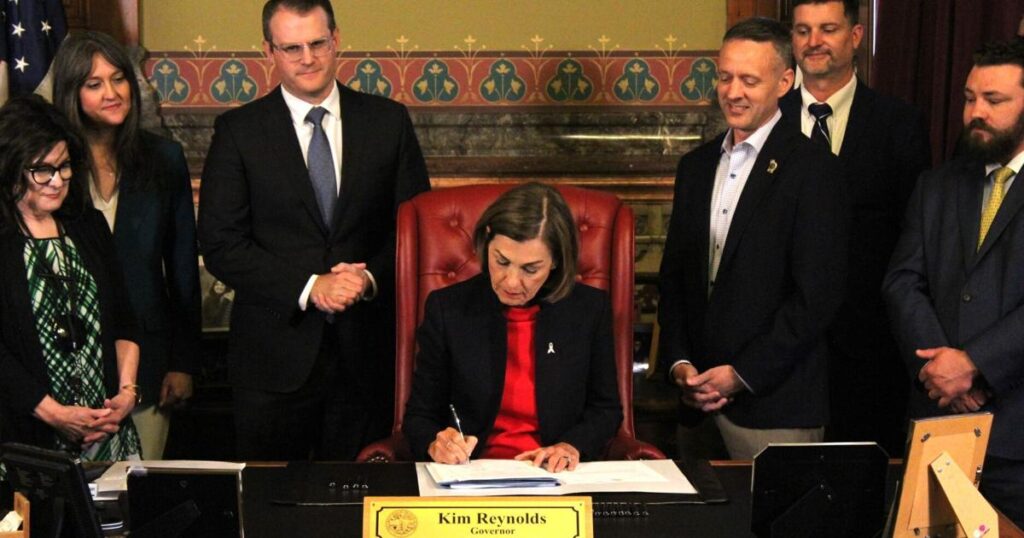Iowa Gov. Kim Reynold vetoed a bill that would increase penalties for violating Iowa's open meetings law, citing concerns that parts of the bill could create a loophole for government agencies to meet behind closed doors. exercised the right.
The bill, House File 2539, would increase fines for violating Iowa's open meetings law to up to $12,500 for a knowing violation and $2,500 for an unknowing violation.
The controversy over the bill stemmed from last-minute amendments that senators added just before passing the bill in the final week of the session.

Iowa Governor Kim Reynolds signed legislation that reduces state income taxes for working Iowans on Wednesday, May 1, during a ceremony in the Governor's Office at the Iowa State Capitol in Des Moines.
Erin Murphy/The Gazette
Iowa's government agencies, boards, and commissions are generally required by law to meet in public and follow certain transparency rules.
Current law allows members of organizations to meet for “administrative or social” purposes as long as they do not discuss policy. The proposed amendments sought to expand these exceptions to make clear that the attendance of members of a government agency at the same event sponsored by a political party, candidate, or civil society organization would not be considered a meeting.
Others are also reading…
But as government transparency groups pointed out in a letter to Reynolds this month, the revised language does not carry over the condition that policy cannot be discussed at such gatherings. The result, they said, was a loophole that allowed government agencies to hold closed-door meetings hosted by political and civil society groups to discuss official policy.
In his veto letter, Reynolds said he echoed those concerns but hoped Congress would continue to push for legislation that would strengthen transparency. This was the only bill Reynolds vetoed this Congress.
“While well-intentioned, the revised definition is unnecessary and will cause confusion,” Reynolds, a Republican, said in the letter. “Open meeting laws need to be clear, otherwise their application and enforcement will be inconsistent and diverse.”
The Iowa Public Affairs Commission and the Iowa Freedom of Information Council warned in a letter to Reynolds this month that the bill could weaken Iowa's open meetings law.
“Instead of clarifying that members of government committees can attend political party or civic group events without violating Iowa's open meetings law, the actual language of the bill on file does not allow the government to discuss policy issues.” Board members attend social and cabinet meetings,” Randy Evans, president of the Iowa Freedom of Information Council, said in a May 14 letter. Ta.
Erica Eckley, executive director of the Iowa Public Affairs Commission, said current law already allows members of public organizations to attend civic and political events as long as they do not discuss policy, so the change is necessary for the purpose of the provision. said it was unnecessary.

Rep. Gary Mohr (R-Bettendorf), chairman of the budget-writing House Appropriations Committee, told the audience at a legislative forum sponsored by the Quad-City Chamber that the work-based learning bill supported by the governor's office is in a separate box. He said he needed to find out. He provided the funding to move it forward. On Friday, March 22, 2024, at St. Ambrose University, MPs answered questions and provided updates on the ongoing session.
sarah watson
Lawmaker: Veto 'doesn't make sense' in Scott County
Rep. Gary Mohr (R-Bettendorf) introduced the bill in the House in response to concerns he had about the city of Davenport's $1.6 million settlement agreement with the former city manager without a public vote of the city council.
He said he was disappointed that the governor vetoed the bill and wished he had contacted him before making a decision. Mohr said he wished Reynolds had signed the bill and that lawmakers corrected any ambiguities in the next legislative session.
“I just don't understand why the governor would veto that bill. I think it's important to increase the penalties fivefold,” he said. “And what's happening in Davenport is going to happen in other places and people will continue to hide public records.”
Mohr said Quad-Cities residents have contacted him with transparency concerns about Davenport's separation agreement and records related to the partial building collapse in May 2023, saying current law is inadequate to address serious violations of the law. said it was insufficient.
“I introduced the original bill in response to public outcry that this wasn't right, and they wanted something done about it,” he said. “That's why I don't think this bill will sit well in Scott County, because Scott County residents are the ones who encouraged me to introduce this bill in the first place.”
Rep. Brent Siegrist, a Republican from Council Bluffs who carried the bill in the House, said he expects House members to revisit the bill next year. He said he thought the House version was stronger before the senators' amendment.
“The Senate saw fit to make the changes in the last hours, otherwise the bill would have been signed and stronger open records laws would have been enacted,” he said. “So we’re going to come back to this issue next year and try to get the House version passed again.”
Erin Murphy of the Gazette Des Moines Bureau contributed to this report


